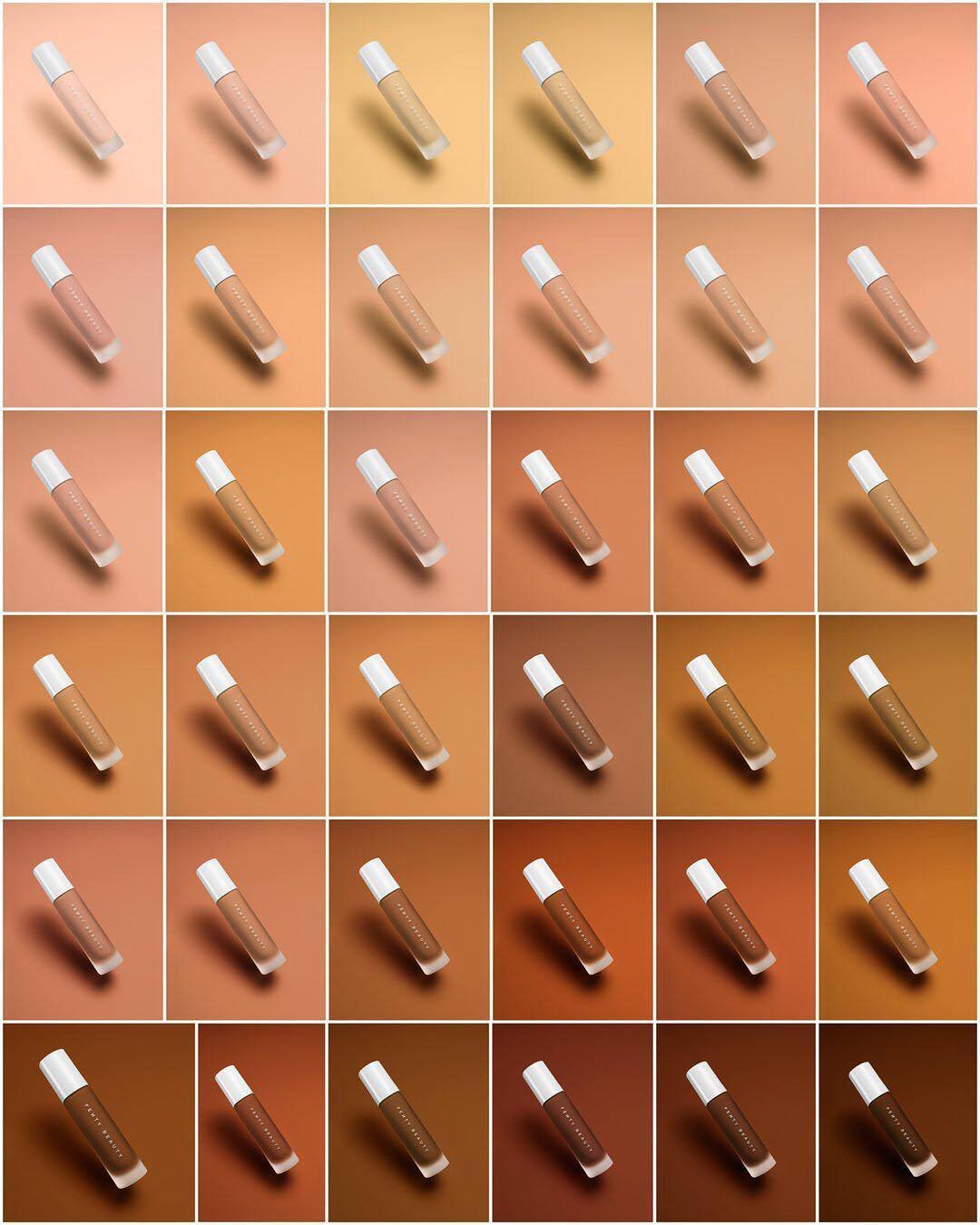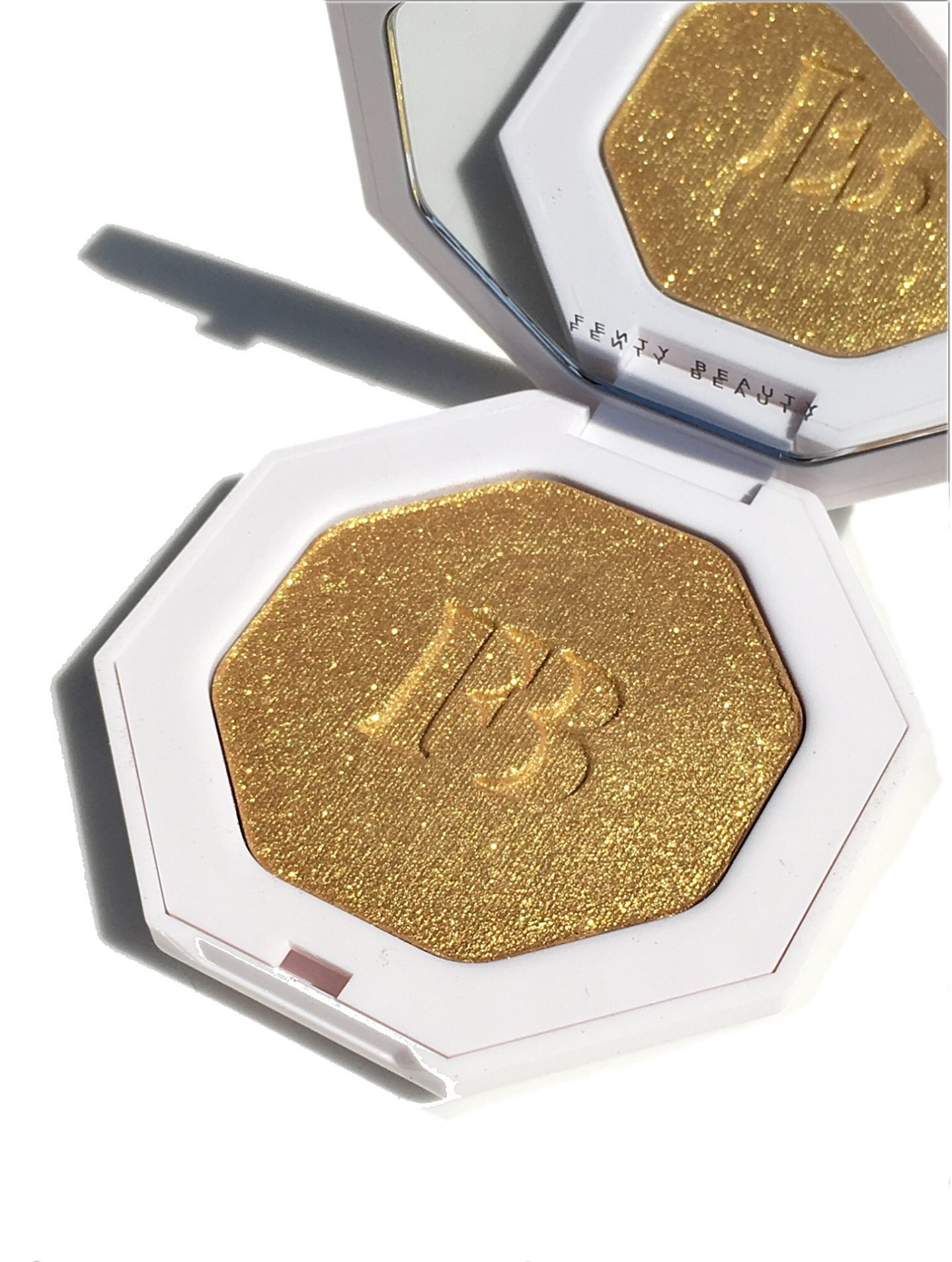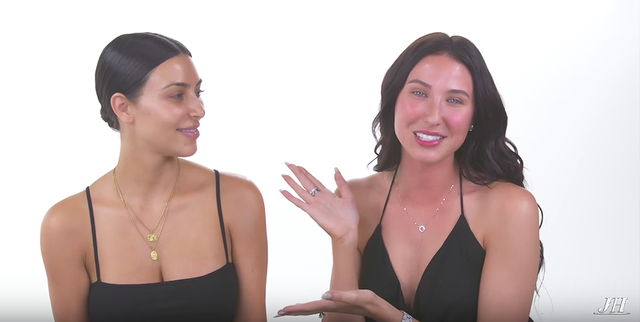It’s Blinding: RiRi and Kim K’s Beauty Marketing
Robyn “Rihanna” Fenty, launched her own line of beauty products in September 2017, a line two years in the making.
And while Rihanna is insanely popular, her line’s popularity comes at least in part from its inclusivity. Fenty Beauty boasts a whopping 40 foundation shades with varying undertones for multitudes of skin tones. They retail for $34, along with other mid-priced items like a foundation brush, sponge, blotting papers, and a newly designed highlighter brush.
If you’re new to the beauty community or someone who doesn’t concern themselves with it (though it’s big enough that you might as well be aware of it) the lack of shade representation for women of color has long been an unwon battle.
This meticulously developed project in collaboration with Kendo (makers of Bite Beauty, Kat Von D, and Marc Jacobs; owned by LVMH) has been lauded by many for its diverse product selection. What’s more, the website boasts a widget for discovering your shade and the issue of selling out of products has been unconventionally avoided due to back stock preparation.
Fenty Beauty launched duo-highlighters retailing for $34 and a single highlighter called “Trophy Wife”, as well as a universal gloss entitled “Gloss Bomb” retailing for $18.
Are you sensing a theme here? If not, Rihanna’s philosophy towards her line might shed some light on it.
“She launched a makeup line “so that women everywhere would be included,” focusing on a wide range of traditionally hard-to-match skin tones, creating formulas that work for all skin types, and pinpointing universal shades.” (fentybeauty.com)
The cherry on top? It’s cruelty-free, paraben-free, mostly vegan (minus some beeswax, carmine, etc), and manufactured without ingredients that contain gluten though they can’t guarantee there aren’t any traces of gluten throughout manufacturing.
It’s the millennial’s dream marketing campaign: eco-friendly practices, lack of toxic materials, inclusive shades, mid-price point, and headed by a fiercely independent mogul. And it comes at the perfect time to be juxtaposed with another colossal launch that took an effective approach vastly different from Fenty Beauty’s.
KKW Beauty | Millennial Pink without the Kumbaya
Ah, the Kardashians. Since their foray into the beauty industry with Kim, Kourtney, and Khloé heading a family line for drugstores, they’ve slowly ascended from mid-range to luxury prices for their products. Their drugstore attempt wasn’t received well, as well as their rebranding of it years past its launch. Their real boost to makeup relevance came from Kim’s famed contouring and Kylie’s liquid lips kits on the heels of her suspicious lip glow-up.
Piggybacking off of Kylie’s line of liquid lips, highlighters, and shadows (though look no further than Colourpop for similar shades and formulas; the same factory makes her lip kits) and her famed makeup look, Kim released liquid lips, contour/highlighter sticks, and contour palettes under KKW Beauty.
One major difference between Fenty Beauty and KKW is the shade range. Obviously contour kits don’t require 40 shades, but surely they require more than fair, medium, dark, and deep dark, as many beauty gurus and buyers have reasoned. This was the main complaint along with the travel-size packaging and the retail price for the sticks: $48. Not to mention the price of the powder palettes: $52.
As for the liquid lips, many reviewers complained that they were nearly all the same variation of one shade and hardly encompassed the needs of most skin types. These retailed for $45 and were “made by Kylie Cosmetics” but all of this really means that the makeup is all produced under Seed Beauty, who famously produces Colourpop products , though their brands webpage mentions two “confidential” brands, of which I can only assume one is KKW.
Despite all of these issues, of course KKW products sold out in little to no time. What’s fascinating to me, however, is why.
Bringing it to the People
So how do you market your celebrity-backed makeup successfully? Your name creates some considerable hype, certainly, but that isn’t the only thing that floats a product.
Both Kim and Rhianna have chosen different avenues and they’re effective in their own ways.
Kim K chose her typical means of creating hype—exclusivity. It’s a mainstream strain of exclusivity, if you can understand the sentiment. She aims to appeal to a large swath of people, but she wants to draw back that appeal with an urgency.
Her product wasn’t stocked sufficiently to make it through a launch and subsequently, sold out very quickly, creating a frantic demand for her contour kits and also justifying her price: “you want them? pay for this exclusive product hand-designed by Kim K” and of course the fans and reviewers will pay.
However, not all reviewers paid, as full press kits of all of KKW products were sent to the largest influencers on YouTube and on beauty blogs, ensuring that she got a wide volume of reviews (reviews which would inevitably be subjective what with the free product and the frantic desire to stay on press lists.)
What’s more, Kim K invited the biggest and brightest YouTube stars with hundreds of thousands of followers to an exclusive launch party, where she took many photos and posted nearly all of them on social media. Try making a bad review after that.
These influencers all got their own tag and post on Instagram on both Kim K’s page and her new beauty line’s page. There was a slight scandal when Kim K forgot (allegedly) to tag Jackie Aina, a prominent black YouTuber famous for her blazing honesty and critique of brands who don’t represent women of color, in her photo. Aina had given an honest review that wasn’t quite shining, but not totally negative towards KKW Beauty. Eyebrows around the internet raised.
On top of this brilliant hype creation and the inclusion of advertising new age influencers (much like fashion embracing fashion bloggers with frontrow seating and clothing brand deals), Kim K went as far as to show up on YouTube’s biggest beauty bloggers’ channels and show them with her product how she contoured.
I have to applaud her for her brilliance. Or at least her PR and Marketing team’s brilliance.
That’s not all, she uploaded to her own YouTube channel with a video entitled “Kim Does Her Own Makeup” and the third-person referential in the title, along with it being a remotely interesting video despite such a banal activity, is what makes all of it so effective. We’re held at a distance with a false “look” into her life. It makes viewers hungry to be like her and to get closer to her.
Again, it’s smart, but it’s certainly precarious from an ethical perspective. Besides Kim Kardashian being a hot topic for both supporters of her and those who disdain her, she has opened the floodgates for celebrity YouTube appearances, which could overshadow the already tapering “everyman” presence on the platform (see networks like NBC, who are whittling away such views and revenue)and give way to more merciless advertising.
Second, a simple look on her website versus Fenty’s gives us the kind of view into customer satisfaction that we will (or won’t) be getting: all sales are final, don’t expect quick confirmation of orders because of the volume of orders, you can’t reserve product, and you can only buy online.
FAQ questions are telling, because it’s either what the comapny has heard the most or expects to hear. I see them as a brand’s “I told you so” or “read the fine print” page, which, in my experience, is where you point customers with grievances and go on your merry way, consequence-free.
For the Masses
There are plenty of marked differences between Rihanna’s strategy and Kim K’s; I certainly don’t have the time and space to cover it all and I’m sure if you’re brave enough to read this far you’re not looking to be here all day.
The main difference here is hyping with exclusivity and inclusivity. Rihanna announced her beauty line on Twitter in May, promising the launch in the fall. Her website was a black screen with a simple email sign-up to notify those interested when it was time to launch.
We heard nearly nothing until days before and then we had another smart move, but this time in Rihanna’s style:
It’s such a good move and the way a lot of consumers want to see the industry turn. A model with an hijab? Multiple women of color? Natural, but empowered?
The hype rose and at last, a launch party as well as a Sephora meetup took place and the products launched with social media tapping away. Even the chosen locale of the launches are in stark contrast to one another. One, a popular makeup store for average makeup buyers. The other, a chic invite-only event.
People were blown away by the sheer amount of shades and the careful explanation Rihanna gave whenever questioned: wanted everyone to feel pretty, wanted shades anyone could use, etc.
A glance at her Fenty Beauty website will tell you instantly: the line is about you. She’s not the feature, plenty of multicolored models dot the pages of product and information—you nearly forget you’re on a celebrity’s beauty site. At the bottom we’re treated with a social media carousel populated with the #fentyface tag and asking us to share our own “Fenty Faces”.
When we head to KKW, it’s Kim, Kim, and Kim with not a model in sight. Even her lip products are variations of her name: Kim, Kiki, Kimmie, Kimberly.
Fenty Beauty claims boldly that it’s the “New Generation of Beauty”, but it’s to be seen which of these marketing ploys plays out to be the winner.
Even if you aren’t fascinated with this as I am, it’s best to be aware of how, as consumers, we’re poked, prodded, and moved to purchase some things over others. Maybe so next time you’re eyes wide watching a promo, you can stop and sort through the tactics.
Because like Trophy Wife and KKW’s highlighters, the hype is blinding.








